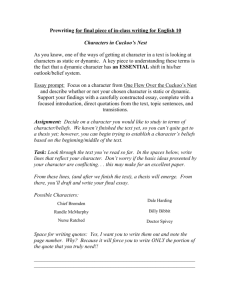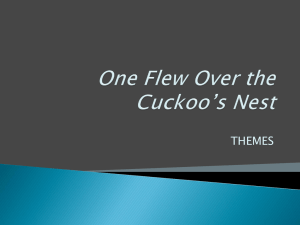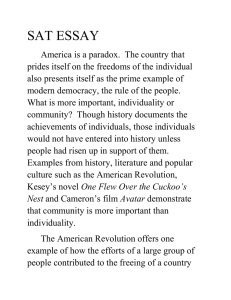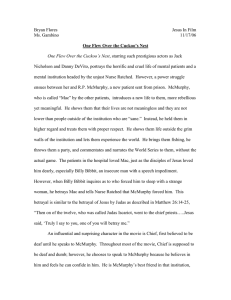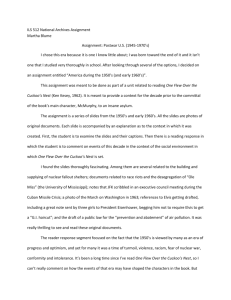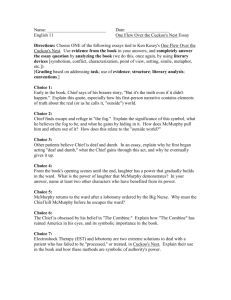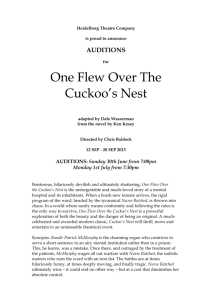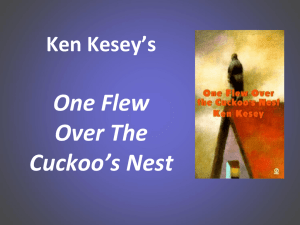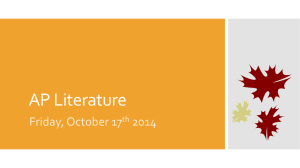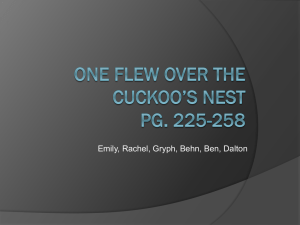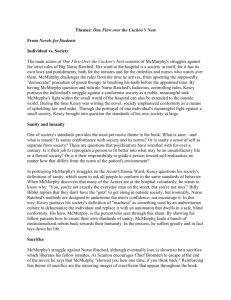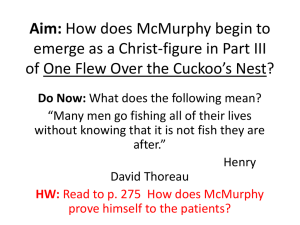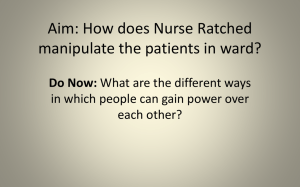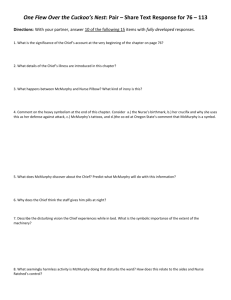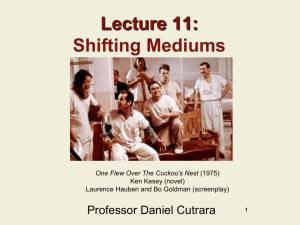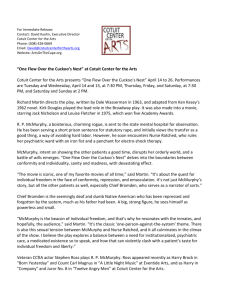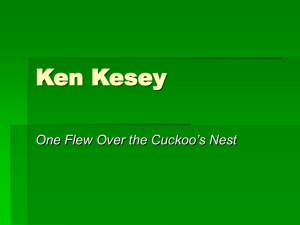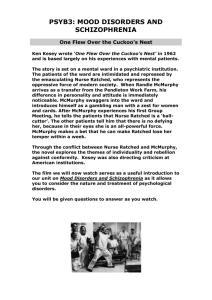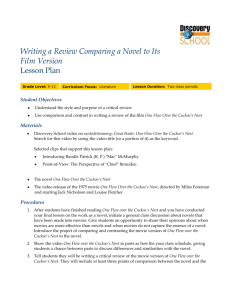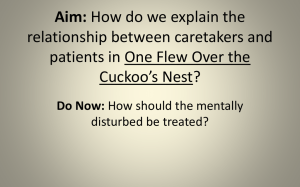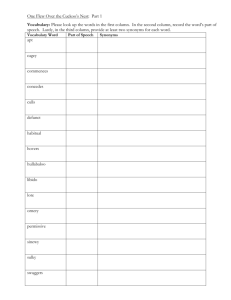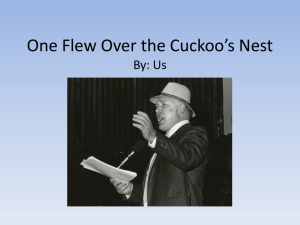File
advertisement
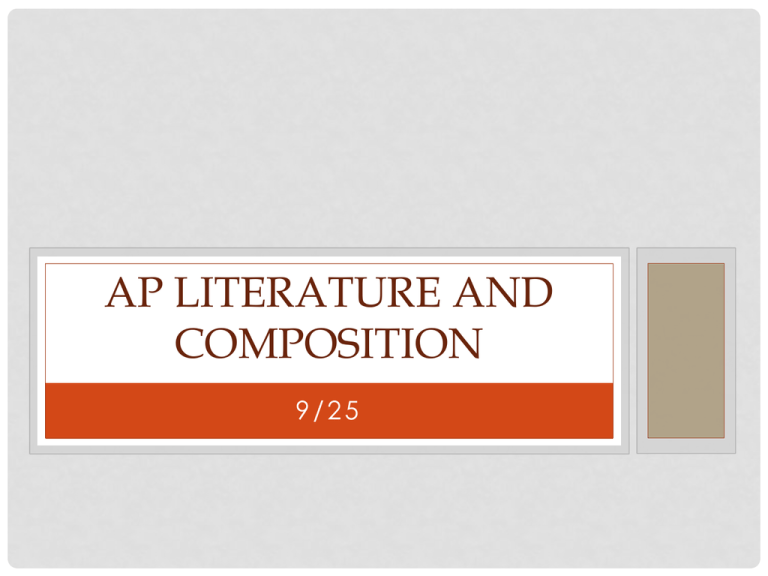
AP LITERATURE AND COMPOSITION 9/25 AGENDA • Re-take quiz over poetry terms. Good Luck! • Chapters 4-5 in One Flew Over the Cuckoo’s Nest • Groups assigned yesterday will discuss questions together writing down their thoughts in order to participate in wholeclass discussion. • Reviewing Vocabulary for Unit 3 • Homework: Read pgs. 76-90 for homework in Cuckoo’s Nest VOCABULARY RETAKE • • • • • You may write on the test. All terms and definitions match up. Use pen or pencil. Use all capital letters please. Move desks away from each other. • Students who are not taking the vocabulary retake should be studying their five words from Unit 3 in the vocabulary book, as well as reading/reviewing Ch. 5 in One Flew Over the Cuckoo’s Nest UNIT 3 VOCABULARY MBCURL.ME/S0ZW I WILL CHECK OFF IF YOU HAVE FINISHED Abominate 1. 2. Acculturation 3. Adventitious 4. Ascribe 5. Circuitous In each column of your graphic organizer list the following: 1. What do you think it means? (Before looking it up) 2. Look up the actual definition and write down a few synonyms. 3. List each word’s part of speech 4. Create your own sentence using the word. GROUPS • Expectations: 1. Discussion of the novel and questions only please. 2. Write down your thoughts in your notebook keeping track of which chapter you are discussing. 3. Note page numbers and refer to the text often citing specific evidence relevant to the question. CHAPTER 4 1. What is the dictionary definition of the noun “Combine”? What is the Chief’s definition? 2. Nurse Ratched maintains control of her ward by hand-picking the doctor and the orderlies. Briefly describe the doctor, three orderlies, and why she thinks they qualify for their jobs. 3. Find a passage in this Chapter that illustrates the recurring motif in this novel that Bromden feels the hospital is like a machine. 4. Find an example of irony in this Chapter. 5. What happens to Mr. Taber under Nurse Ratched’s care? Why do you think the author includes this information about Mr. Taber at this point in the story? CHAPTER 5 1. Review the definition of a psychopath from the first part of Section I. What evidence is there in McMurphy’s record that supports the diagnosis that he is a psycopath? 2. What is the theory of the Therapeutic Community? Cite incidents from the story to support or refute the following statement: Nurse Ratched’s ward follows the principles of a Therapeutic Community. 3. What is the double meaning of Pete Bancini’s comment, “I’m tired”? 4. Harding has been humiliated by the others concerning his wife and her affairs. How does McMurphy describe what happened at the group meeting? CHAPTER 5 5. Define “matriarchy.” Some critics of this book believe Kesey is accusing women of trying to run the world and emasculate the males of the world. Cite incidents from the story which support this idea. 6. State a theme for this novel based on the following passage: “I haven’t heard a real laugh since I came through that door, do you know that? Man, when you lose your laugh you lose your footing. A man go around lettin’ a woman whup him down til he can’t laugh any more, and he loses one of the biggest edges he’s got on his side.” HOMEWORK •Read up to pg. 90 in One Flew Over the Cuckoo’s Nest. •No essay this weekend, but a possible reading quiz on Monday. •Next week we will review Question #2 Essays and 15 other vocabulary words for Unit 3 INTRODUCTION TO NOVEL • Man’s right to be an individual versus society’s need to make him conform. • This theme is reflective of the social climate of the 1960’s. • Other ideas to note throughout the novel: • • • • what is sanity? how authority cripples people? is the natural man better off free? can the simple force of one’s personality overcome the repression of society? • While the story is rooted in the ideals and cultures of the 1960’s, many of the concerns are as relevant today as they were then. REVIEWING TERMS FOR DISCUSSION • Motif - a situation, incident, idea, or image that is repeated significantly in a literary work. • Examples: In Hamlet, revenge is a frequently repeated idea. In The Catcher in the Rye, Holden continually comments on the phoniness of people he meets. • Irony -a perception of inconsistency, sometimes humorous, in which the significance and understanding of a statement or event is changed by its context. • Example: The firehouse burned down. CHAPTER 2 1. How does the Chief know the new Admission is “no ordinary Admission”? 2. What evidence is there in this section of patient abuse? 3. Briefly describe R. P. McMurphy. What does the description of McMurphy’s hands suggest to the reader about his character? Why is the Chief impressed with McMurphy’s laugh? 4. Define “psychopath.” Why is McMurphy in the hospital? CHAPTER 3 1. Briefly identify Ellis and Ruckly. Why do you think the author includes so many details about these two minor characters? 2. Describe Harding. Why do you think Billy identifies Harding as the “bull goose loony”? What do Harding’s hands reveal about his character? 3. What new information is revealed about Chief Bromden when McMurphy asks Billy Bibbit about him? 4. What pieces of information are revealed near the end of the section?
